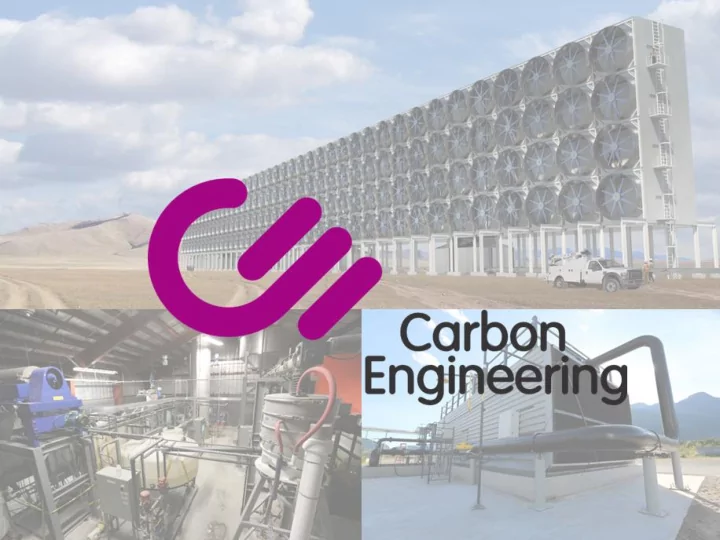

Carbon Engineering Investors / Partners Management Team • Bill Gates $18 M • Murray Edwards $15+ M Adrian Corless David Keith CEO Exec Chair / Founder Susan Koch CFO Intellectual Property Recognition 8 patents + 22 pending: $25 M • P-Ca process Virgin Earth Challenge • Air Contactor Finalist • low-CI fuel manufacture
DAC - Direct Air Capture of CO 2 • Compared to CCS: • Higher thermodynamic barrier. • Larger air volume to be processed. DAC storage, industrial use, or fuel production
DAC - Direct Air Capture of CO 2 • Freedom of location. • Greenfield builds. • Locate at point of storage/demand. • Manages emissions from any source. • Targets those not amenable to DAC CCS. • Enables negative emissions. • Physical carbon offsets. storage, industrial use, or fuel production • Closed carbon-cycle fuels.
Technology
CE’s DAC Technology - Chemistry 6
CE’s DAC Technology - Partnerships Leading global cooling tower Pelletization technology Global EPC, plus ore roasters supplier. holders for wastewater. and kilns. Key technical similarities with 3 years collaboration on CE’s Joint development of CE’s CE air contactor. pellet reactor unit. CFB kiln. Supplying CE air contactor. Supplying CE pellet reactor. Technical oversight for CE pilot calciner. Joint engineering and Continued joint development. development. Calciner technology provider. 7
CE’s DAC Technology – Process Basics • N th plant costs: Inputs: Air, water, natural gas. • $100-120/ton-CO 2 -captured. Electricity produced on-site. • $70-80/ton-CO 2 -delivered. Output: High pressure CO 2 : Adaptation for fuel synthesis: 1 ton-CO 2 from air + • Partial replacement of natural gas 0.5 ton-CO 2 from natural gas with renewable electricity. • O 2 integration with electrolysis. 1.5 ton-CO 2 delivered • Low pressure output.
Markets and Commercialization
Global CO 2 Emissions • IPCC-5 and NAS both recognize CO 2 removal as necessary part of avoiding catastrophic climate change. Fuels (Renewables) • Direct air capture Sequestration (Carbon Removal)
Market Opportunities - Offsets DAC “Platinum quality” CO 2 offsets are generated and sold to industrial emitters DAC can offer verifiable offsets based on physical mass flows, for sectors where reduction at source is too difficult or costly. Future opportunity.
How to decarbonize transportation? $ $ transportation is 1/3 of CO 2 $ trillions in global infrastructure it’s harder to eliminate carbon emissions used to distribute high energy from transportation than from stationary sources density fuels
How to decarbonize transportation carbon-neutral electrification biofuels hydrogen hydrocarbons H 2 • no local • niche • high energy • high energy density pollution opportunities unit per mass • compatible with $ • battery energy • high land • difficult to trillions of global density 3% of footprint transport infrastructure liquid fuels • competes with • requires total • low land-use footprint • electricity source agriculture infrastructure • enabled by direct air determines turnover capture of CO 2 carbon intensity
Carbon-Neutral Hydrocarbons with DAC DAC DAC Cars Fuels Fuel Synthesis Aircraft Heavy Freight Solar, Wind, Nuclear Sequestration or EOR Fuel Synthesis Direct Offsets
Air-to-Fuel: Why at all? Why now? Why at all? Why now? 1. Compatible with today’s Convergence of major advancements: infrastructure and engines. 1. Direct Air Capture of CO2 at 2. Globally scalable, avoids land use industrial scale developed by CE and food security issues of biofuels. 2. Dramatic drop (3x) in cost of large 3. High energy density allows use in air scale solar PV over last 5 years. and heavy transport sectors. 3. Multiple vendors now delivering 4. Can be blended with conventional MW and greater PEM Electrolyzers fuels in increasing amounts over 4. Availability of fuel synthesis time. technology with high conversion • Enables progressive transition. efficiencies from multiple sources. ~$1.00/L liquid fuels with low carbon intensity.
Technology Precedent Hydrogenics, ON. Grid e - to H2. CRI, Iceland. CO 2 to MeOH. Sunfire, Dresden. CO 2 to FTL. Shell Pearl, Qatar. GtL (140,000 bpd).
Fischer-Tropsch Pathways CO 2 Reduction or CO 2 CO “FTL” Fischer – Existing RWGS Tropsch Refining H 2 O H 2 Water Electrolysis Methanol Synthesis CO 2 MtG MeOH Gasoline Methanol or Synthesis Olefins H 2 O H 2 MtO Water Electrolysis This is an integration/optimization play. Modest technical risk.
CE Squamish Demonstration Plant
Hardware Development History 2005: Spray Tower 2008: Packed Tower 2010: Lab air contactor 2011: Pellet Reactor Tests 19 2013: Calciner Tests 2014-2015: Full end-to-end pilot plant 2011-2012: Air Contactor Prototype
Demonstration Plant - Design 20
Demonstration Plant - Site
Demonstration Plant - Equipment 22
24
25
28
Demo Plant Operating Data Plant data slides cut for distribution.
Conclusions and Next Steps DAC Pilot: • Core performance targets achieved. • Operations will continue 2016-2017. • Continued optimization on Pellet Reactor and Calciner. Air to Fuels Demo Plant: • Engineering a 1 bbl/day fuel demo (CO2, water, and elec). • Goal is to demonstrate a pathway that has commercial scale costs of ~$1.00 /L • 2016-2018 First Commercial plant: • Targeting ~2018 kick-off for 100,000 ton-CO2/yr (~700 bbl/day) commercial plant. N th Plants: • 30 Scale up to 1 Mt/yr (~7,000 bbl/day).
Policy Requirements First Plant: • Targeted support. • End user premium. For wide-spread adoption, continued policy evolution is needed: • Carbon tax (or fee-bate) is helpful. • But higher prices needed for transportation sector, and “residual” emissions. • LCFS in more jurisdictions, or Nation-wide. • Emphasis on performance metrics: • Carbon intensity, land use, etc. • Double crediting sub- program for “advanced fuels” to help transformative technologies into the market. 31
Thank you. Questions?
Recommend
More recommend